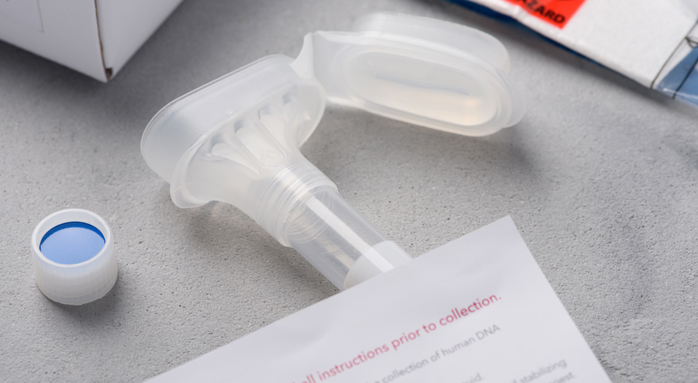
Is Rheumatoid Arthritis inherited, and is there a genetic test for it?
August 30, 2005

- Related Topics:
- Autoimmune disease,
- Medical genetics,
- Complex traits,
- Genetic testing
A curious adult from California asks:
"Three of my grandparents had Rheumatoid Arthritis and my mother now has it. It appears, at least on the surface to me, to be at least partially related to genetic inheritance. Is this indeed true? And if so, is there a genetic marker that can be tested for and are they using this to help find a cure?"
Editor’s Note (7/30/2021): Since this article was published, we have learned that there are over 20 genes associated with Rheumatoid Arthritis.2 However, genetic tests for the disease are still under development. You can read more about the genetics of Rheumatoid Arthritis here.
You are right; genes do play a role in rheumatoid arthritis. But they are not the whole story. The environment seems to play a role as well.
As if that wasn't complicated enough, there is almost certainly more than one gene involved. A disease caused by more than one gene is called a complex disease. What a fitting name!
Complex diseases are hard to pass on from one generation to the next. That's because you have to pass most, if not all the disease genes to your kids for them to get the disease. The more genes that are involved, the less likely that is.
Researchers have found at least a handful of genes that are important in rheumatoid arthritis, but the number of reported genes keeps growing. So how many disease genes are needed to cause arthritis is still anyone's guess.
In a complex disease, each of the different genes makes a small contribution to the disease. Not only that, but you don't always need the same combination of genes. The sum of all contributions just has to be high enough to put someone at risk.
So how could rheumatoid arthritis get inherited?
Inheritance of Complex Diseases
Let's say you have a mother who has rheumatoid arthritis. She has two sets of genes: one from her mother, the other from her father. In other words, she has two copies of most of her genes. Some copies may contribute to arthritis, others not.
She will only pass one copy of each gene to her child. To pass on the disease, she will need to pass on those versions of the genes that contribute to arthritis. Since most genes have only a 50% chance of being passed on to the child, the child will probably not get all the disease genes his mother has.
Of course, the child's father may also contribute some disease genes. But unless the child gets a sufficient number of disease genes, he or she probably won't develop rheumatoid arthritis.
In other words, many people actually carry disease genes, just not enough to ever develop the disease. As you can imagine, all this makes it less likely that complex diseases run in families for many generations.
So how would you test for a disease that has lots of genes involved? And not always the same genes?

Genetic Testing for Complex Diseases
Obviously, genetic testing can be pretty difficult in such a case. For one thing, it's pretty challenging for researchers to find all of the genes involved in a complex disease. And once you've found them, well, you'd need to do a lot of testing on one person.
But maybe you don't need to know all of the genes involved to predict someone's risk. If you knew one or more genes that contribute the most to the disease, you could just test for those. That wouldn't be an exact test, but you could still get important information from it.
This is what used to be done for Alzheimer's. Doctors used to test for this disease using a marker called APOE. This marker could help predict disease risk, even though more genes were involved in the disease. But this test is now used only by researchers, not by doctors to screen patients.
That's because many people that have the Alzheimer's version of the marker don't get the disease. So screening people for this marker before they actually show any signs of the disease may get them worried for the rest of their lives.
In the case of rheumatoid arthritis, researchers have found such a marker, too. It's called HLA-DR4.1
This marker is found more often in people with the disease than in people without it. So a person with this marker has a higher risk of developing rheumatoid arthritis than a person who doesn't have it.
But just like the case with APOE for Alzheimer's, the HLA-DR4 marker is not used in diagnosis. Again, that's because many people who don't get arthritis don't have this marker. Also, many people with rheumatoid arthritis don't test positive for it.
Rheumatoid Arthritis is an Autoimmune Disease
Researchers have not yet found the exact causes of rheumatoid arthritis. But they do agree that it is a disease of the immune system.
An important part of the immune system is white blood cells. These cells make antibodies that protect us from invaders like bacteria and viruses. But in rheumatoid arthritis, the white blood cells mistakenly attack the linings of the joints. This is called an autoimmune disease.
The antibody that attacks the joints is called rheumatoid factor (RF). Doctors can use a blood test to find out how much RF a person has in their blood. But the test results have to be interpreted carefully. That's because while RF levels are often very high in people with rheumatoid arthritis, they aren't always.
Why the white blood cells attack the joints is still a big mystery. But this might be where the environment comes into play.
One theory is that germs could trigger this. People that are genetically predisposed to arthritis may get abnormal reactions to the germ and develop the disease.
White blood cells patrol the body for germs. If they see a germ, they produce lots of antibodies that can attack the germ. So the immune system gets trained to look for anything that looks like that particular germ and to attack it.
In autoimmune diseases, the human body produces something that looks very similar to a particular germ or a virus. The immune system then has a hard time figuring out what to fight and what not, so it might go ahead and attack both.

Other Possible Causes of Rheumatoid Arthritis
How could this work for rheumatoid arthritis? Let's say your set of rheumatoid arthritis genes makes your joints look like a certain germ. If you are never infected with that germ, then this wouldn't matter.
But if the germ does infect you, then there might be trouble. Your white blood cells will most likely fight the germ by making antibodies against it. Unfortunately, your white blood cells will mistake your joints for the germs and attack those, too. That's how you could wind up with rheumatoid arthritis.
The germ comes from the environment. It could infect you whether or not you have the rheumatoid arthritis genes. But you will get rheumatoid arthritis only if you do get infected, and if you have the set of rheumatoid arthritis genes that makes your joints look like that germ.
So, under this theory you need both the environment and your genes to interact to get rheumatoid arthritis. Keep in mind that researchers are still working on finding the exact causes of the disease. There could be other explanations; we just don't know them yet.
There is no real cure yet for rheumatoid arthritis. Most treatments deal with the inflammation and pain that happen when the linings of the joints are attacked. The latest treatments can target those parts of the immune system that are out of control in rheumatoid arthritis. These treatments can make the disease manageable.
As more and more genes that are involved in rheumatoid arthritis become known, they will certainly play an important role in treating arthritis, and maybe help find a cure.
Knowing the combination of disease genes a person with a complex disease has could predict which treatments would work best for that person, and which ones won't work well. It might also suggest new treatments based on the kinds of genes that are involved.
That's why researchers are in hot pursuit of the genes and markers important for complex diseases. Hopefully soon we will have identified enough markers to create useful tools in either designing treatments or deciding which treatment a patient might respond best to.

Author: Simone Marticke
When this answer was published in 2005, Simone was a Ph.D. candidate in the Department of Genetics, studying global mechanisms of transcription in mammalian cells in Rick Myers’ laboratory. Simone wrote this answer while participating in the Stanford at The Tech program.
 Skip Navigation
Skip Navigation
